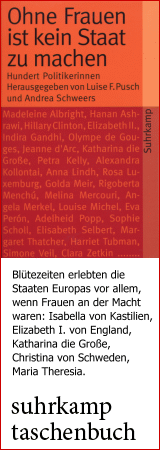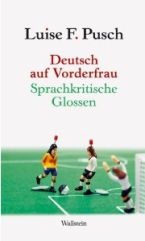
born August 17, 1953 in Nitchidorf (German Nitzkydorf), Romania
German-Romanian writer (Nobel Prize in Literature 2009)
70th birthday on August 17, 2023
Biography
Herta Müller began writing under extremely difficult circumstances which gave little indication that she would one day receive the Nobel Prize in Literature. Born on August 17, 1953, she grew up in the small, German-speaking village of Nitchidorf in Romania. Her ancestors were Banat Swabians who sent their children to German schools. Nitchidorf was no bucolic idyll; Müller felt “homeless and unfree” among the demoralized villagers, who had failed to come to terms with their Nazi complicity and some of whom were informers for the totalitarian Ceauşescu regime. Her irascible father had been an SS soldier; her mother was damaged by the five years spent in a forced labor camp in the Soviet Union. Resentment and distrust, selfishness and injustice were her earliest impressions. It was not until she was fifteen that Herta Müller learned Romanian. She has described her initial writing in German as an attempt to cope with the silence and existential angst she experienced growing up. Her texts are colored by many autobiographical references.
The Nobel Committee praised Müller as someone “who, with the concentration of poetry and the frankness of prose, depicts landscapes of the dispossessed.” The presentation speech also emphasized that the reader of her prose quickly grasps that “something concerning life or death is at stake.” In a collection of autobiographical essays, Der König verneigt sich und tötet (2003, English title The King Bows and Kills), the author gives the following explanation:
In writing, I must go to where I am most hurt inside as there would otherwise be no need for me to write at all.
The author does not completely trust words. In a 2009 interview she does concede, however, that language is indeed powerful:
It's not true that there are words for everything. It's also not true that you always think in words. There are inner realms devoid of language that pull you to places where no words can exist.
Müller's artful use of language, inventive word combinations, unusual metaphors and illuminating images nevertheless allow her a glimpse “between the sentences” into the realms that elude consciousness.
After graduating from high school, she studied German and Romanian at the West University of Timişoara from 1973 - 1976 and then worked as a translator in a machine factory. Only a small circle of friends initially knew of her texts, which dealt with the effects of political pressure on people. Her first book, Niederungen (English title Nadirs), is a collection of short stories published in 1982 in Bucharest in a heavily censored version. In terse sentences and unusual metaphors, she draws a realistic picture of the existing society, at times alluding to the latent uneasiness and hidden distortions in a fractured, surrealistic fashion:
Perhaps my mouth was like a ripe pea pod. I imagine it dry and thin like the lips I didn't want to have. A Swabian smile was like the father I didn’t choose for myself. Like the mother I didn't want to have.
Niederungen was published in its uncensored version in Germany in 1984. She then at first remained in Romania, where she had been persecuted for years. She was summoned to degrading interrogations by the Securitate, the Romanian secret police force, and experienced daily harassment. She had friends in the anti-government Aktionsgruppe Banat, and the group was soon also in the crosshairs of the Securitate. Paradoxically, her friends there then accused her of having spied on them for the Securitate, a lie she easily disproved as an attempt to discredit her. After experiencing hostility at work, dismissal, a resulting meager existence as a substitute teacher, and death threats, she left Romania with an exit permit and travelled to Berlin in 1987 with her then husband, the writer Richard Wagner. She has continued to write about her experiences and the situation in her native Romania. As she later learned from a 914-page secret file marked ‘Cristina’, however, the Securitate pursued her even as she lived in exile as a German citizen in Berlin.
Her productivity flourished in Germany and ten books were published between 1984 and 1994. Herztier (1994, English title The Land of Green Plums) in particular found a wide circle of readers. She returns to her student years in this novel to relate the story of a group that reads Western literature in secret and is soon persecuted by the Securitate. The physical threats and psychological pressures lead some of her friends to commit suicide, in one case even afterwards while in exile. The text is based on true events; it is therefore not surprising that underlying Herta Müller's literary achievement and her linguistic art is a clear sense of justice that vehemently rejects political rationalizing or personal excuses.
In more than two dozen publications to date, she has continued to focus on the Ceauşescu dictatorship in Romania and the period leading up to his death. Her book Der Fuchs war damals schon der Jäger (1992, English title The Fox Was Ever the Hunter) arose from the screenplay for a feature film she wrote with her current husband, Harry Merkle. Whereas prior to 2009 this focus meant that Müller was largely unknown among the general public, the critics had very quickly taken note of the high quality of her prose. She had received the Kleist Prize as early as 1994, and this was followed in 1998 by the international Dublin Literary Award, the world's most valuable literary prize at €100,000. The prominence she gained as a result protected her from further attacks by the Securitate.
In the same year she was awarded the Nobel Prize she published her widely acclaimed novel Atemschaukel (English title The Hunger Angel), which recalls the fate of her compatriot and friend, the Büchner Prize winner Oscar Pastior, who was deported as a 17-year-old and spent four years in a Siberian labor camp simply for being a German-Romanian. Pastior was originally to be her co-author for a documentary collection of texts on the subject. However, he died in 2006, and she was dismayed to learn afterwards that he too had been forced to work for the Securitate. Müller transformed the material into a novel whose poetic intensity was highly praised by the critics. Stefana Sabin, writing for the Neue Zürcher Zeitung, sums up not only Atemschaukel, but also Herta Müller's achievement in general:
Her prose, whose energy is fueled by horror, is at the same time full of beauty and a great joy for the reader. This is how memory speaks when it is alive. Your breath catches in your throat as the words leap in the air. And in addition to all the hunger, the misery, the dying in the labor camp, there is an unbelievable amount of happiness here. (27.09.09)
The author remains intent on grappling with the past in a reappraisal that is no longer quite fashionable.
I left Romania behind me a long time ago. But what I have never left behind is the organized and willful neglect of people in a dictatorship. (Bei uns in Deutschland, 2012)
Despite her concentration on writing, Müller regularly makes time for public appearances both in Germany and abroad. She holds visiting professorships at German universities (Hamburg, Bochum, Tübingen, Berlin, Paderborn), and has been a writer-in-residence in several countries (University of Warwick, Dickinson College, University of Wales in Swansea, University of Florida). In 2010 she was awarded an honorary doctorate by Seoul Women's University and in 2012 she received the same honor from the University of Paderborn, Swansea University and Dickinson College. Her tireless advocacy for human rights and her public criticism of intellectual cowardice remain constants in her life.
Probably to compensate, Müller creates a playful, surreally grotesque world of her own in collage poetry. The delightful collections Die blassen Herren mit den Mokkatassen (The Pale Gentlemen with their Espresso Cups, 2005) and Vater telefoniert mit den Fliegen (Father is phoning the Flies, 2012) include examples with fragments cut out of newspapers and magazines which touch again and again on the incongruities of the present:
and nothing turns up In the Alphabet of Fear as clumsily as a dog's head and at the same time as delicately as a lizard as the present
(Text from 2012; translated with DeepL.com; edited by Ramona Fararo, 2023)
Please consult the German version for additional information (pictures, sources, videos, bibliography).
Author: Helga Kraft
Links
nobelprize.org/prizes/literature/2009/ceremony-speech/
If you hold the rights to one or more of the images on this page and object to its/their appearance here, please contact Fembio.



